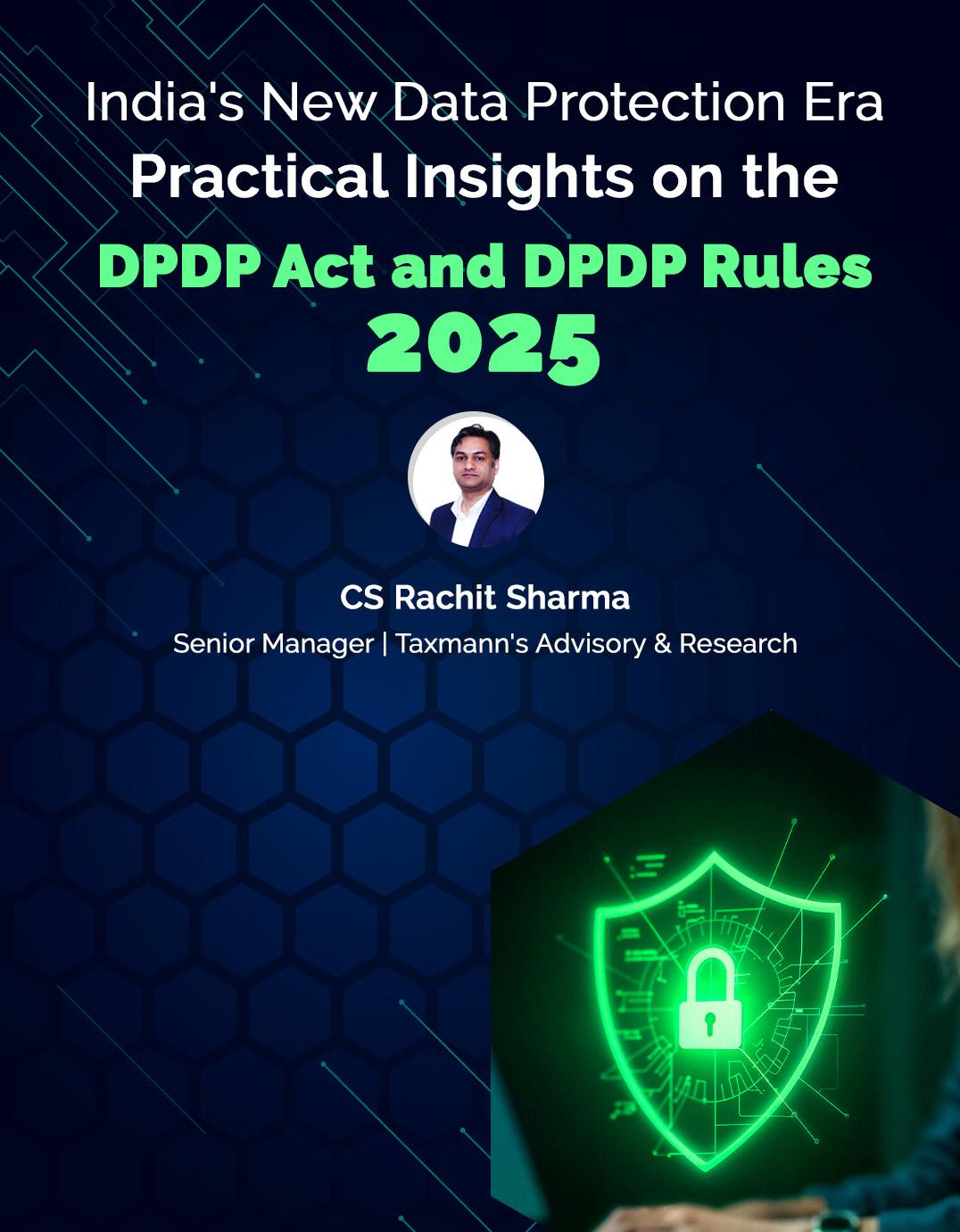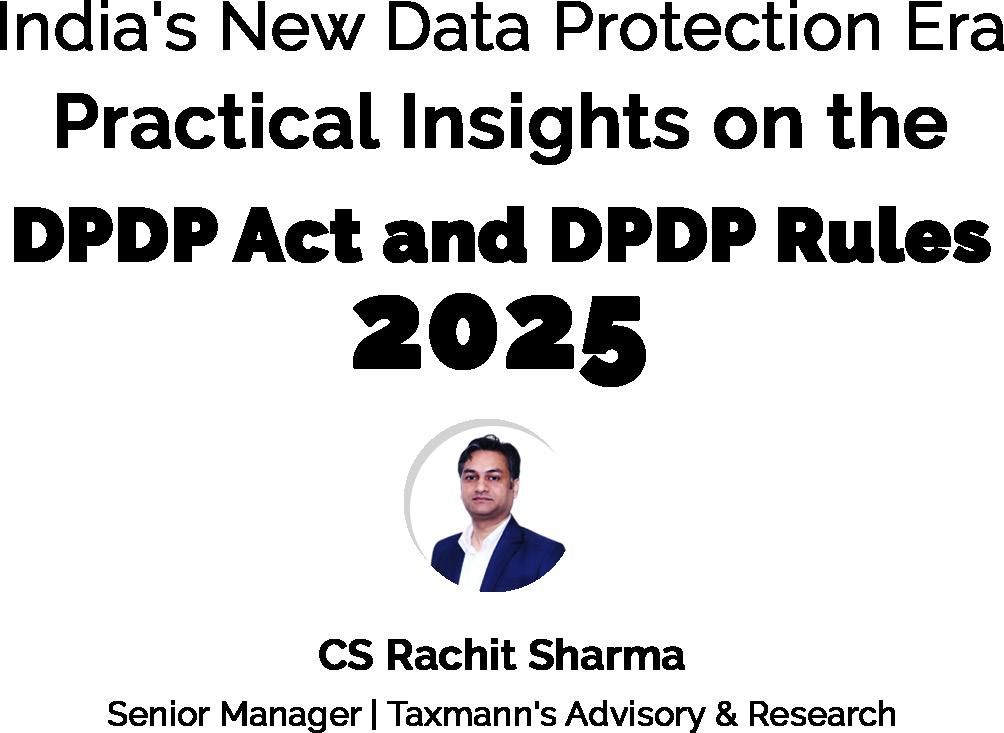










The Digital Personal Data Protection Rules, 2025 (DPDP Rules), published on November 13, 20251, together with the phased launch of the Digital Personal Data Protection Act, 2023 (DPDP Act)2, bring essential clarity to India’s regulatory environment. This formal activation establishes a mandatory compliance roadmap for Data Fiduciaries and officially launches India’s new privacy framework.
The framework adopts a structured, three-stage implementation approach – immediate setup (institutional), a one-year phase (activating the Consent Manager ecosystem), and an eighteen-month phase (activating core operational compliance). This phased schedule grants organisations a necessary, though tight, timeline to implement fundamental changes across their technology, legal, and governance models.
The immediate priority is institutional setup. The Data Protection Board of India (DPBI) is formally established3, and its governing rules (Rules 1, 2, 17-21) are effective immediately. This means the regulator is now operational. Organisations must urgently prioritise the technical infrastructure needed for verifiable consent, prompt breach notification (72 hours), and automated data erasure processes to meet the May 2027 deadlines. Strategic planning must align resources and roadmaps with this strict compliance timeline.
The Central Government has adopted a deliberate, staggered approach to commencing the DPDP Act and the DPDP Rules, 2025, ensuring the enforcement structure is ready before the core compliance obligations are activated.
The provisions that commenced immediately focus on establishing the institutional machinery and laying down the foundational legal definitions. The Key sections now in force include Section 1(2), Section 2 (Definitions), the entire Chapter V (Sections 18–26) establishing the DPBI, Sections 35 (Protection of good faith action), Sections 38–43 (Miscellaneous provisions including rule-making power), and sub-sections (1) and (3) of Section 44 (Amendments to certain Acts). Correspondingly, the DPDP Rules governing the Board’s initial functions (Rules 1, 2, and 17 to 21) are effective immediately upon publication. 1
2
3
This intermediate phase is focused entirely on establishing the Consent Manager ecosystem. The provisions coming into force one year from Notification include Section 6(9) of the Act (mandating Consent Manager registration) and Section 27(1)(d) (DPBI power to inquire into breaches of registration conditions). Correspondingly, Rule 4 of the DPDP Rules, detailing the registration and obligations of a Consent Manager, also commences after one year. This grants the Consent Manager the necessary time to meet stringent standards and register before core consent rules are activated.
The final phase, commencing eighteen months after Notification, activates the majority of operational compliance obligations on all Data Fiduciaries. The provisions coming into force include Sections 3–5 (Application, Processing Grounds, Notice), Section 6(1)–6(8) and 6(10) (Core Consent rules), Sections 7–17 (Certain Legitimate Uses, General Obligations, Children’s Data, SDF duties, Data Principal Rights), Sections 27 (except 27(1)(d)), 28–34, 36–37 (DPBI Powers, Penalties, Enforcement), and Section 44(2) (Amendments to the IT Act, 2000). The bulk of the DPDP Rules—including Rules 3, 5 to 16, 22, and 23—are aligned with this timeline. This May 2027 date is the hard deadline for Data Fiduciaries to integrate new consent flows, security standards, and erasure mechanisms.
13-Nov-25
Sections 1(2), 2, 18–26, 35, 38–43, 44(1)&(3)
• Chapter I – Preliminary – 1(2) (Short title & commencement); 2 (Definitions)
• Chapter V – Data Protection Board of India – Sections 18–26 (Establishment & composition of Board)
• Chapter IX –Miscellaneous – Sections 35 (Appeals), 38–43 (Miscellaneous)
Rules 1, 2, 17–21
The regulatory architecture is formally live — the Board and core framework are legally activated. Focus shifts to operationalising staff, systems and compliance readiness.
One Year (Nov 2026)
Sections 6(9), 27(1)(d)
Eighteen Months (May 2027)
Sections 3–5, 6(1)-(8), 6(10), 7-17, 27 (except 27(1) (d)), 28-34, 36-37, 44(2)
• Section 44(1) & (3) – “Power to make rules” & “Savings/Repeals” (within Chapter IX)
• Chapter II – Obligations of Data Fiduciary – Section 6 (Consent) (DPDPA)
• Chapter VI –Powers, Functions and Procedure to be Followed by Board – Section 27 (Powers & functions of Board)
• Section 27(1)(d) –“Powers and functions of Board”
• Section 6(9) –“Consent”
• Chapter I – Preliminary – Sections 3–5 (“Application of the Act”; “Interpretation”; “Scope”)
• Chapter II – Obligations of Data Fiduciary – Section 6 (Consent) and Sections 7-10 (Certain legitimate uses; General obligations; etc)
• Chapter III –Rights and Duties of Data Principal – Sections 11–15 (Access, Correction, Erasure, Grievance, Nomination)
• Chapter IV – Special Provisions – Sections 16–17 (Processing outside India; Exemptions)
Rule 4 A year’s window for the Consent Manager ecosystem and fiduciaries to get in place-register, and meet technical/ financial standards— before full consent-regime enforcement.
• Chapter VI –Powers, Functions and Procedure of Board – Sections 28–34 (Procedure of Board)
• Chapter VIII –Penalties and Adjudication – Sections 33-34) and Sections 36-37 – “Penalties and adjudication”
• (Chapter IX –Section 44(2) –“Power of Central Government to issue notifications”)
Rules 3, 5–16, 22, 23 This is the full implementation phase – all data fiduciaries must embed consent-flows, rights-mechanisms, security/erasure standards and register with the Board as per the regime.
The DPBI, the central enforcement body, is formally established as a body corporate, headquartered in the National Capital Region of India4. The Board will consist of four members.5
A core feature of the DPBI is the mandate to function as a “digital office”. It must adopt “techno-legal measures” (Rules 20 and 22) to ensure all proceedings— from complaint receipt to final decisions—are conducted primarily through online or digital modes. Rule 20 confirms that the Board shall function as a digital office, allowing it to conduct proceedings without requiring the physical presence of any individual.
This design significantly impacts Data Fiduciaries, as the regulator’s adjudication process is engineered for digital interaction; organisations must ensure their internal logs, audit trails, and systems are digitised and ready for seamless digital inquiry processing. This effectively raises the standard for required digital governance maturity across all regulated entities.
The DPDP Rules detail the governance structure, including the appointment of the Chairperson and Members via prescribed committees (Rules 17, 18). Meetings
4 Notification No. G.S.R. 844(E), Dated 13-11-2025
5 Notification No. G.S.R. 845(E), Dated 13-11-2025
require a quorum of one-third of the membership, with decisions made by majority vote.
Crucially, Rule 19(9) sets a maximum inquiry period. All inquiries must be completed within six months from the date of receipt of the intimation or complaint, unless an extension (not exceeding three months at a time) is recorded in writing. This mandatory timeline demands that Data Fiduciaries develop the capacity for rapid and efficient response to regulatory requests.
The DPDP Act requires a high standard for valid consent (Section 6), which must be “free, specific, informed, unconditional and unambiguous with a clear affirmative action”. “free, specific, informed, unconditional and unambiguous with a clear affirmative action”.
Rule 3 specifies the required format for the accompanying notice – it must be presented clearly and be understandable independently of any other information provided. The notice must include – an itemised description of the personal data sought, the specified purpose(s) of processing, and a specific description of the goods or services provided. Additionally, the notice must outline the means by which the Data Principal can exercise their rights, including the right to withdraw consent. Rule 3(c)(i) explicitly mandates that the ease of withdrawing consent must be comparable to the ease with which consent was initially given. This anti-dark pattern provision imposes a clear technical requirement – if consent is one-click, withdrawal must be similarly straightforward, backed by audit trails to demonstrate compliance parity.
Data security is a non-delegable duty. Section 8(5) requires Data Fiduciaries to take reasonable security safeguards to prevent a personal data breach. Failure to meet this standard risks the highest maximum penalty of ₹250 Crore.
Rule 6 defines “reasonable security safeguards,” detailing mandatory minimum measures:
a) Data Security – Securing personal data via encryption, obfuscation, masking, or virtual tokens.
b) Access Control – Measures to control access to computer resources.
c) Visibility – Maintaining appropriate logs, monitoring, and review to detect unauthorised access.
d) Resilience – Implementing reasonable data-backups and other measures for continued processing if data integrity is compromised.
e) Contractual Requirements – DF-Data Processor contracts must include security safeguard provisions.
A key operational mandate is the explicit requirement to retain logs and personal data for a minimum period of one year. This retention is mandatory for detecting, investigating, and remediating unauthorised access, making log management a critical legal compliance task.
Rule 7 establishes a strict, dual-stream obligation for breach notification:
a) Intimation to Data Principal – The Data Fiduciary must intimate each affected Data Principal “without delay,” through her user account or registered mode of communication. The notice must be concise and clear, detailing the nature of the breach, likely consequences, the Fiduciary’s mitigation measures, and safety measures the Data Principal should take.
b) Intimation to the Board – The Fiduciary must immediately inform the Board (“without delay”) of the breach description and likely impact. Within seventy-two hours of becoming aware of the breach, a detailed update must be submitted to the Board, covering facts, mitigation steps, findings, remedial measures, and a report on intimations sent to Data Principals.
The 72-hour reporting timeline requires organisations to have a high level of Incident Response Maturity, capable of rapid forensic analysis and formal regulatory reporting within three calendar days.
The Act provides a clear principle – a Data Fiduciary must erase personal data once consent is withdrawn or as soon as it is reasonable to assume the specified purpose is no longer being served, unless legal retention is required.
Rule 8 defines when a purpose is “deemed to be no longer served” for large-scale e-commerce, online gaming, and social media entities (those with specified user counts). For these Fiduciaries, if the Data Principal has not engaged with the Fiduciary or exercised her rights, the data must be erased after the corresponding period in the Third Schedule, typically three years.
This mandates active, automated Data Lifecycle Management (DLM) systems capable of tracking user inactivity against the three-year period, triggering erasure, and managing notifications. Rule 8 also requires the Data Fiduciary to inform the Data Principal at least forty-eight hours before erasure, providing a final window for contact.
The necessity to comply with two concurrent retention periods—the conditional
erasure (Rule 8(1), Schedule III) and the mandatory minimum retention of associated traffic data and logs for one year (Rule 8(3))—requires precise data tagging and robust automated governance layers.
The Central Government may notify any Data Fiduciary as a Significant Data Fiduciary (SDF) based on factors like the volume and sensitivity of data, risk to Data Principal rights, and impact on sovereignty (Section 10). SDFs face a substantially elevated compliance burden (Rule 13).
The core obligations include:
a) Mandatory Annual Assessments – Conducting a Data Protection Impact Assessment (DPIA) and an audit every twelve months.
b) Reporting – Submitting a report of significant observations from the DPIA and audit to the Board.
c) Dedicated Personnel – Appointing a Data Protection Officer (DPO) based in India and responsible to the Board of Directors, and appointing an Independent Data Auditor.
d) 5.2. Algorithmic Due Diligence
Rule 13 introduces a clear mandate for algorithmic governance – SDFs must verify that technical measures, including algorithmic software used for hosting, display, or sharing of personal data, are not likely to pose a risk to the rights of Data Principals.
This requires organisations to incorporate Algorithmic Risk Assessment into their annual compliance and auditing cycle, extending governance to the integrity and fairness of proprietary Machine Learning and Artificial Intelligence (AI) systems.
The DPDP Act establishes a nuanced framework for cross-border data transfer. Rule 15 provides the general rule – personal data may be transferred outside India, subject to restrictions the Central Government may specify by order. This establishes a permissible transfer regime unless specifically restricted.
However, the framework imposes stricter rules on SDFs. Rule 13(4) mandates that SDFs must undertake measures to ensure that personal data specified by the Central Government is processed subject to the restriction that the personal
data and the associated traffic data are not transferred outside the territory of India.
This measure grants the Central Government the power to mandate data localisation for specific, high-risk data categories handled by the largest platforms. Compliance teams must actively monitor subsequent notifications defining these restricted data categories.
The Act imposes elevated duties when processing the personal data of children (under 18) and Persons with Disability (PwD).
Section 9(1) mandates obtaining the verifiable consent of the parent before processing any personal data of a child. Rule 10 details the required technical and organisational measures.
Data Fiduciaries must verify that the individual identifying as the parent is an identifiable adult. Verification can reference:
a) Reliable identity and age details already held by the Fiduciary.
b) Identity and age details provided voluntarily, potentially via a virtual token mapped to such details, issued by an authorised entity.
The Rules explicitly authorise the use of identity and age details made available and verified by a Digital Locker Service Provider. This formalises the use of India’s digital public infrastructure for verification, requiring companies serving child Data Principals to prioritise API integration with these services.
The strict mandates of verifiable consent (Sec 9(1)) and the prohibition on tracking, behavioural monitoring, and targeted advertising (Sec 9(3)) have specific exemptions.
Exempt classes (Schedule IV Part A) include:
a) Healthcare establishments are restricted to processing necessary information for providing health services to the child.
b) Educational institutions are restricted to tracking and monitoring necessary for educational activities or the safety of enrolled children.
c) Transport providers engaged by schools or crèches are restricted to location tracking for safety.
Exempt purposes (Schedule IV Part B) include:
a) Processing necessary for government provision of subsidy, benefit, or service (under Sec 7(b)) in the interest of the child.
b) Real-time location tracking for a child’s safety, protection, or security.
c) Processing is strictly necessary for the Data Fiduciary to confirm that the Data Principal is not a child.
For Data Principals who are PwD and require a lawful guardian, Rule 11 mandates specialised due diligence. The Data Fiduciary must verify that the guardian was appointed by a court of law, a designated authority, or a local-level committee, according to applicable guardianship law. This ensures legitimate legal capacity to consent on behalf of vulnerable Data Principals.
The Consent Manager (CM) acts as a critical intermediary, enabling the Data Principal to give, manage, review, and withdraw consent through an interoperable platform.
The registration conditions (First Schedule, Part A) are rigorous, ensuring high standards for entrants. Key conditions include:
a) Must be a company incorporated in India.
b) Must demonstrate sufficient capacity (technical, operational, and financial).
c) Must have a minimum net worth of not less than two crore rupees (₹2 Crore).
d) Requires independent certification that the CM’s interoperable platform aligns with data protection standards published by the Board.
CMs have significant obligations (First Schedule, Part B), including acting in a fiduciary capacity towards the Data Principal and strictly avoiding conflicts of interest with Data Fiduciaries. Further, CMs must also maintain records of all consent activities for a minimum period of seven years.
The DPDP Act clearly states that the Data Fiduciary remains primarily and ultimately responsible for compliance (Section 8(1)), regardless of any processing carried out by a Data Processor. This non-delegable accountability
necessitates a strong contractual relationship. Rule 6(f) mandates that the Data Fiduciary – Data Principal (DF-DP) contract must include appropriate provisions ensuring that the Data Processor implements reasonable security safeguards. This structure compels Data Fiduciaries to conduct intensive due diligence and ongoing monitoring of their vendor ecosystem.
The DPBI is empowered to handle complaints, investigate violations, and impose penalties. It can direct urgent remedial or mitigation measures immediately in cases of data breach. For inquiries, the Board is vested with the powers of a civil court, including the ability to summon attendance, examine witnesses, and inspect data and documents.
Section 32 allows the Board to accept a Voluntary Undertaking (VU) from a person at any stage of a proceeding. Acceptance of the VU bars further proceedings regarding the subject matter, but breach of the undertaking is deemed a breach of the Act itself, leading to penalties.
Section 33 authorises the Board to impose monetary penalties specified in the Schedule if a breach is determined to be significant. Penalty determination considers factors such as the nature, gravity, and duration of the breach, the type of data affected, repetitive nature, any gain realised, and the effectiveness of mitigation actions.
The scale of maximum fines emphasises data security and protection of children as regulatory priorities.
1. Failure to take reasonable security safeguards
2. Failure to notify the Board/Data Principal of a data breach
Sec. 8(5) May extend to two hundred and fifty crore rupees (₹250 Crore)
Sec. 8(6) May extend to two hundred crore rupees (₹200 Crore)
3. Breach in observance of obligations related to Children
4. Breach of additional obligations by SDFs
Sec. 9 May extend to two hundred crore rupees (₹200 Crore)
Sec. 10 May extend to one hundred and fifty crore rupees (₹150 Crore)
The ₹250 Crore maximum penalty for security failures (Section 8(5)) highlights the severe view taken on inadequate technical protection, necessitating that security funding be prioritised as a core risk reduction mandate.
The DPDP Rules, 2025, provide the specific operational details necessary for compliance. The eighteen-month runway for core obligations (May 2027) requires immediate and comprehensive action across all organisational domains.
a) Phase-Gated Compliance – Segment compliance into structured projects –Phase 1 (0-12 months) must focus on Consent Manager Strategy and breach protocol readiness (Rule 4, Rule 7). Phase 2 (12-18 months) requires the full deployment of compliant consent mechanisms (Rule 3) and automated erasure systems (Rule 8).
b) Data Inventory and Mapping – Conduct a comprehensive exercise to classify data streams, define all “specified purposes,” and ensure current data retention policies align with the statutory deadlines and the mandatory minimum log retention periods.
c) SDF Status Preparation – Organisations nearing high volume/sensitivity thresholds should proactively prepare for potential SDF designation by establishing dedicated DPO roles (India-based, reporting to the Board of Directors) and onboarding independent data auditors.
d) Vendor Contract Review – All contracts with Data Processors must be urgently updated to incorporate the mandatory security safeguard provisions required by Rule 6(f) and to confirm the Data Fiduciary’s nondelegable accountability (Sec 8(1)).
(a) Security Uplift and Log Management - Immediately review and enhance security measures (Rule 6), focusing on mandatory data encryption, masking, and robust access control. Highest priority must be given to complying with the one-year log retention mandate (Rule 6(e), Rule 8(3)), requiring substantial, secure logging infrastructure investment.
(b) Incident Response Maturity – Given the mandatory 72-hour reporting timeline to the DPBI (Rule 7), Incident Response Plans must be fully mature, enabling rapid forensic investigation, impact assessment, and formal statutory reporting within the compressed timeframe.
(c) Verifiable Consent Infrastructure – For platforms processing child or vulnerable Data Principal data, immediately initiate integration with authorised identity verification systems (such as the Digital Locker Service Provider) to meet the Rule 10 verifiable consent standard by May 2027.
a) Algorithmic Governance – Significant Data Fiduciaries must embed the Rule 13(3) requirements into their product development lifecycle. This involves systematically subjecting decision-making algorithms (AI/ML) to specific privacy and rights impact assessments to institutionalise Algorithmic Due Diligence.
b) DLM Automation – Implement sophisticated, automated Data Lifecycle Management systems capable of tracking user inactivity, managing complex retention periods, and executing the mandatory 48-hour preerasure notification protocol (Rule 8).
The DPDP Rules, 2025, transform India’s data protection framework, demanding foundational changes in governance, technical operations, and risk management. The eighteen-month commencement period is a tight schedule for these technical and resource-intensive compliance projects. Organisations must act decisively to mitigate the severe financial and legal risks associated with non-compliance.


Founded 1972


Evolution From a small family business to a leading technology-oriented Publishing/Product company


Expansion

Launch of Taxmann Advisory for personalized consulting solutions

Aim
Achieve perfection, skill, and accuracy in all endeavour

Growth
Evolution into a company with strong independent divisions: Research & Editorial, Production, Sales & Marketing, and Technology

Future
Continuously providing practical solutions through Taxmann Advisory
Editorial and Research Division
Over 200 motivated legal professionals (Lawyers, Chartered Accountants, Company Secretaries)
Monitoring and processing developments in judicial, administrative, and legislative fields with unparalleled skill and accuracy
Helping businesses navigate complex tax and regulatory requirements with ease

Over 60 years of domain knowledge and trust
Technology-driven solutions for modern challenges
Ensuring perfection, skill, and accuracy in every solution provided
Income Tax
Corporate Tax Advisory
Trusts & NGO Consultancy
TDS Advisory
Global Mobility Services
Personal Taxation
Training
Due Diligence
Due Dilligence
Advisory Services
Assistance in compounding of offences
Transactions Services
Investment outside India
Goods
Transaction Advisory
Business Restructuring
Classification
Due Diligence
Training
Advisory
Trade Facilitation Measures
Corporate
Corporate Structuring
VAT Advisory
Residential Status

Naveen Wadhwa Research and Advisory [Corporate and Personal Tax]
Chartered Accountant (All India 24th Rank)
14+ years of experience in Income tax and International Tax
Expertise across real estate, technology, publication, education, hospitality, and manufacturing sectors
Contributor to renowned media outlets on tax issues

Vinod K. Singhania
Expert on Panel | Research and Advisory (Direct Tax)
Over 35 years of experience in tax laws
PhD in Corporate Economics and Legislation
Author and resource person in 800+ seminars

V.S. Datey
Expert on Panel | Research and Advisory [Indirect Tax]
Holds 30+ years of experience
Engaged in consulting and training professionals on Indirect Taxation
A regular speaker at various industry forums, associations and industry workshops
Author of various books on Indirect Taxation used by professionals and Department officials

S.S. Gupta
Expert on Panel | Research and Advisory [Indirect Tax]
Chartered Accountant and Cost & Works Accountant
34+ Years of Experience in Indirect Taxation
Bestowed with numerous prestigious scholarships and prizes
Author of the book GST – How to Meet Your Obligations', which is widely referred to by Trade and Industry

Manoj Fogla
Expert on Panel | Research and Advisory [Charitable Trusts and NGOs]
Over three decades of practising experience on tax, legal and regulatory aspects of NPOs and Charitable Institutions
Law practitioner, a fellow member of the Institute of Chartered Accountants of India and also holds a Master's degree in Philosophy
PhD from Utkal University, Doctoral Research on Social Accountability Standards for NPOs
Author of several best-selling books for professionals, including the recent one titled 'Trust and NGO's Ready Reckoner' by Taxmann
Drafted publications for The Institute of Chartered Accountants of India, New Delhi, such as FAQs on GST for NPOs & FAQs on FCRA for NPOs.
Has been a faculty and resource person at various national and international forums

the UAE
Chartered Accountant (All India 36th Rank)
Has previously worked with the KPMG

Taxmann Delhi
59/32, New Rohtak Road
New Delhi – 110005 | India
Phone | 011 45562222
Email | sales@taxmann.com
Taxmann Mumbai
35, Bodke Building, Ground Floor, M.G. Road, Mulund (West), Opp. Mulund Railway Station Mumbai – 400080 | Maharashtra | India
Phone | +91 93222 47686
Email | sales.mumbai@taxmann.com
Taxmann Pune
Office No. 14, First Floor, Prestige Point, 283 Shukrwar Peth, Bajirao Road, Opp. Chinchechi Talim, Pune – 411002 | Maharashtra | India
Phone | +91 98224 11811
Email | sales.pune@taxmann.com
Taxmann Ahmedabad
7, Abhinav Arcade, Ground Floor, Pritam Nagar Paldi
Ahmedabad – 380007 | Gujarat | India
Phone: +91 99099 84900
Email: sales.ahmedabad@taxmann.com
Taxmann Hyderabad
4-1-369 Indralok Commercial Complex Shop No. 15/1 – Ground Floor, Reddy Hostel Lane Abids Hyderabad – 500001 | Telangana | India
Phone | +91 93910 41461
Email | sales.hyderabad@taxmann.com
Taxmann Chennai No. 26, 2, Rajan St, Rama Kamath Puram, T. Nagar
Chennai – 600017 | Tamil Nadu | India
Phone | +91 89390 09948
Email | sales.chennai@taxmann.com
www.taxmann.com
Taxmann Bengaluru
12/1, Nirmal Nivas, Ground Floor, 4th Cross, Gandhi Nagar
Bengaluru – 560009 | Karnataka | India
Phone | +91 99869 50066
Email | sales.bengaluru@taxmann.com
Taxmann Kolkata Nigam Centre, 155-Lenin Sarani, Wellington, 2nd Floor, Room No. 213
Kolkata – 700013 | West Bengal | India
Phone | +91 98300 71313
Email | sales.kolkata@taxmann.com
Taxmann Lucknow
House No. LIG – 4/40, Sector – H, Jankipuram Lucknow – 226021 | Uttar Pradesh | India
Phone | +91 97924 23987
Email | sales.lucknow@taxmann.com
Taxmann Bhubaneswar
Plot No. 591, Nayapalli, Near Damayanti Apartments
Bhubaneswar – 751012 | Odisha | India
Phone | +91 99370 71353
Email | sales.bhubaneswar@taxmann.com
Taxmann Guwahati
House No. 2, Samnaay Path, Sawauchi Dakshin Gaon Road
Guwahati – 781040 | Assam | India
Phone | +91 70866 24504
Email | sales.guwahati@taxmann.com